Kiwithrottlejockey
Admin Staff
XNC2 GOD

Posts: 32251
Having fun in the hills!
|
 |
« Reply #350 on: September 14, 2014, 12:30:50 am » |
|
from The Telegraph....Lord Bannside — obituaryLord Bannside was, as Ian Paisley, the firebrand
leader of Protestant oppositon to a united Ireland.By Telegraph reporters | 1:54PM BST - Friday, 12 September 2014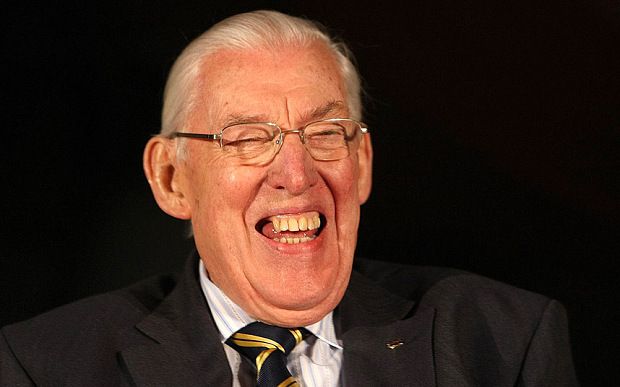 Dr Ian Paisley, the former Democratic Unionist Party leader. — Photo: PA.LORD BANNISDE, who has died aged 88, was better known as the Reverend Ian Paisley, a towering figure who founded Northern Ireland’s Free Presbyterian Church and Democratic Unionist Party. Dr Ian Paisley, the former Democratic Unionist Party leader. — Photo: PA.LORD BANNISDE, who has died aged 88, was better known as the Reverend Ian Paisley, a towering figure who founded Northern Ireland’s Free Presbyterian Church and Democratic Unionist Party.
He took an uncompromising sectarian line before, during and after the “Troubles” — for the outbreak of which he bore some responsibility — yet ended his political life as First Minister sharing power with his old enemy, Sinn Fein.
Paisley was often dismissed by commentators outside the Province as a bigot and a buffoon. His political career was repeatedly written off, yet by its end he had outmanoeuvred his moderate Unionist rivals to become Ulster’s elder statesman, the spokesman for a majority of Unionists and undisputed leader of the largest party in the Northern Ireland Assembly.
Few could have imagined such an outcome in the Sixties, when the young, uncouth firebrand first led working-class Protestants in vociferous opposition to the genteel Unionism of Terence O’Neill, then prime minister of Northern Ireland.
His fiery blend of sectarian preaching and political oratory, which drew heavily on the book of Revelation and the spicier parts of the Old Testament, proved highly potent during the 1974 Ulster Workers’ Strike, when Loyalists — enraged by plans for an all-Ireland dimension to their government — brought down the power-sharing administration established under the Sunningdale Agreement.
At the core of Paisley’s being was a visceral loathing of the Roman Catholic Church, which would have done credit to a 17th-century Ranter. He liked to whip his audiences into a frenzy with his rhetoric about “Old Red Socks” (the Pope); the “great whore... with whom the kings of the earth have committed fornication” (the Roman Catholic Church); and about those who “breed like rabbits and multiply like vermin” (its adherents).
He once tried to ban a school production of The Sound of Music because crucifixes were to be carried on stage. As an MEP, he described the EU as a “beast ridden by the Harlot Catholic Church” and part of a plot against Protestantism.
Woe betide the Catholic who incurred Paisley’s wrath: “Priest Murphy,” he apostrophised a cleric who objected in 1958 to his holding meetings in Ballymoney Town Hall, “speak for your own bloodthirsty, persecuting, intolerant, blaspheming, political-religious papacy, but do not dare to be a spokesman of free Ulster men.”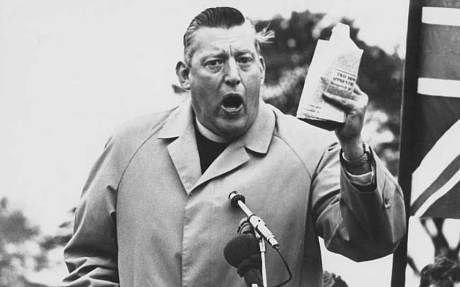 Ian Paisley addressing a meeting in Belfast in 1972. — Photo: Getty Images.In Paisley’s version, the story of Ulster was a long catalogue of betrayal by Unionists and Westminster politicians. True Unionists were obliged to fight for themselves: “Come ye out from among them and be separate” had been the dominant biblical text of his childhood and was the essence of his message to his flock. For more than 40 years the self-styled “Voice of Protestant Ulster” articulated the instinctive fears of its grassroots that compromise and conciliation would lead inexorably to a united Ireland. To them, Paisley had saved the Province from this terrible fate. Ian Paisley addressing a meeting in Belfast in 1972. — Photo: Getty Images.In Paisley’s version, the story of Ulster was a long catalogue of betrayal by Unionists and Westminster politicians. True Unionists were obliged to fight for themselves: “Come ye out from among them and be separate” had been the dominant biblical text of his childhood and was the essence of his message to his flock. For more than 40 years the self-styled “Voice of Protestant Ulster” articulated the instinctive fears of its grassroots that compromise and conciliation would lead inexorably to a united Ireland. To them, Paisley had saved the Province from this terrible fate.
The inflammatory force of Paisley’s rhetoric was intensified by his physical presence. At 6ft 4in and burly until his later years, he was “the Big Man” to his supporters. Yet he possessed both humour and warmth. As an MP at Westminster and Strasbourg, and later as a member of the Northern Ireland Assembly, he scrupulously served his Catholic constituents as faithfully as his Protestant ones.
In the European Parliament, he co-operated amiably on Northern Ireland matters with his fellow Euro-MP, the nationalist John Hume. “I am anti-Roman Catholic,” he told his supporters, “but God being my judge, I love the poor dupes who are ground down under that system.”
In fact, Paisley held views on abortion and divorce and on the arrogance of the English political class that differed little from those of his Catholic counterparts. When in 1968 he met the Nationalist Bernadette Devlin at a secret tea party, they found themselves in broad agreement about the common grievances of the Protestant and Catholic working classes.
But there was never any hope of uniting in a common cause, for — as Paisley told Devlin — in the last analysis he would rather be British than fair. And since loyalty to the Union and to the Protestant religion were inextricably intertwined in Paisley’s mind, he persisted in his divisive fulminations about the Catholic Church.
Paisley’s anachronistic quality fascinated and appalled English observers, who seemed rarely to speak his name without the precursor “that dreadful man”. In Northern Ireland, however, the view of Paisley — among both Protestants and Catholics — was more complex. In his earlier years, his tireless exploitation of inflammatory rhetoric seriously damaged the image of Unionism abroad, and drove frightened Catholics closer to the IRA. The IRA leader Daithi O Conaill, asked about a rumour that there were plans to assassinate Paisley, replied that it would never happen: “Paisley is the best recruiting sergeant we’ve got.”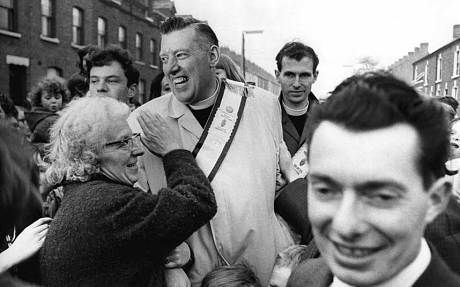 Ian Paisley at a rally in Belfast. — Photo: Camera Press.Moreover, while Paisley condemned Loyalist attacks on Catholics throughout his career, in the Eighties he flirted with the prospect of Protestant “people’s militias” and once conveyed journalists to a hillside in County Antrim at night to witness 500 men in military formation brandishing firearms licences. Loyalist paramilitaries criticised him for inciting them to violence, then distancing himself when it occurred. Ian Paisley at a rally in Belfast. — Photo: Camera Press.Moreover, while Paisley condemned Loyalist attacks on Catholics throughout his career, in the Eighties he flirted with the prospect of Protestant “people’s militias” and once conveyed journalists to a hillside in County Antrim at night to witness 500 men in military formation brandishing firearms licences. Loyalist paramilitaries criticised him for inciting them to violence, then distancing himself when it occurred.
The bulk of Unionists felt alienated from the rigidity of Paisley’s massive certainties. But when any whiff of compromise was in the air, his intransigence became a reassurance to people unable to break free from their history. He remained the most popular man in Ulster politics, topping the poll in every European Parliament election from 1979 to 1999.
In the 2003 Assembly elections, Unionists rejected the moderate Unionism of David Trimble and voted for Paisley and his party, not because they cared about his views on the Sabbath, but because they believed Paisley would not “sell out” to the Republic or Sinn Fein.
Ian Richard Kyle Paisley, the younger of two sons, was born on April 6th 1926 in the Catholic section of Armagh. His father, whose family was descended on both sides from early 17th-century Scottish settlers at Sixmilecross, County Tyrone, had served in Carson’s Ulster Volunteer Force during the 1912-13 Home Rule crisis. Later, James Paisley became a drapery store assistant and Baptist pastor who formed his own breakaway church at Ballymena, where Ian attended the Model School and the Technical High School.
In 1942 Paisley enrolled in the Barry School of Evangelism of the Reformed Presbyterian Church, a small sect that had broken with the mother Church in the 17th century. He was ordained by his father in 1946 and appointed minister at the Ravenhill Evangelical Mission Church in Belfast. He became active in the National Union of Protestants, which campaigned for the election of fundamentalist Loyalists to the Stormont Parliament.
In 1951 Paisley was invited to conduct a mission at Crossgar, County Down, where his uninhibited preaching split the congregation; in consequence he founded the Free Presbyterian Church, with himself as moderator: “We in Crossgar,” he declared, “are going back to the old standards and to preach the faith of our fathers.” Despite the opening in Belfast in 1969 of Martyr’s Memorial, one of the largest modern Protestant churches in Europe, the Free Presbyterian Church remained a minority faith with no more than 10,000 followers by 1981.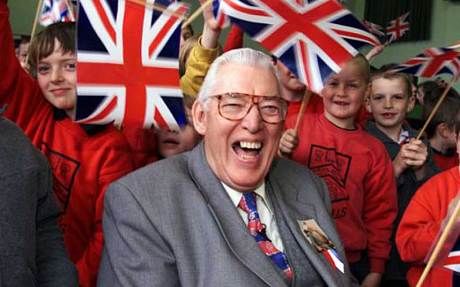 Ian Paisley. — Photo: PA.The foundation of his Church handicapped Paisley’s political career in that it was never recognised by the Orange movement. Paisley had joined the Orange Order after the war, and by 1951 was chaplain of two of its lodges. But the Orange Grand Lodge refused to recognise his ministry, and he made himself unpopular by launching an attack on a Grand Master who would not condemn the advertising of alcohol. Though he remained in demand as a preacher, Paisley finally left the Order in 1962 in protest at the attendance of the Lord Mayor of Belfast at a Requiem Mass. Ian Paisley. — Photo: PA.The foundation of his Church handicapped Paisley’s political career in that it was never recognised by the Orange movement. Paisley had joined the Orange Order after the war, and by 1951 was chaplain of two of its lodges. But the Orange Grand Lodge refused to recognise his ministry, and he made himself unpopular by launching an attack on a Grand Master who would not condemn the advertising of alcohol. Though he remained in demand as a preacher, Paisley finally left the Order in 1962 in protest at the attendance of the Lord Mayor of Belfast at a Requiem Mass.
Paisley’s dedication to the Lord never inhibited his appetite for publicity. In 1958 he denounced the Queen Mother and Princess Margaret for “committing spiritual fornication with the anti-Christ” by visiting Pope John XXIII. In 1962 he handed out Protestant pamphlets in St Peter’s Square and accused the Archbishop of Canterbury, Michael Ramsey, of “slobbering on his slippers” when he met the Pope. In 1963, after John XXIII’s death, he expressed his satisfaction that “this Romish man of sin is now in Hell”.
Also in 1962, Paisley resigned from Ulster Protestant Action, which strove to keep jobs in Protestant hands and resist the “dark sinister shadow” of Dublin, to “concentrate on Church affairs”. But during the 1964 general election he provoked riots by objecting to an Irish tricolor outside the Republican headquarters in Belfast and sloganising against an ice cream shop of “Italian Papists on the Shankhill Road”.
The next year Paisley headed the opposition to the meeting in Belfast of O’Neill and the Taoiseach, Sean Lemass: “No Mass, No Lemass” read the placards, and “IRA murderer welcomed at Stormont”. In 1966 Paisley’s appeal for a “renewal of the spirit of Carson” resulted in the re-formation of the UVF, which is said to have carried out bomb attacks designed to look like IRA outrages, though Paisley was never directly implicated.
In July 1966, after several attempts, Paisley achieved a modest martyrdom by getting sent to jail for three months after insulting Presbyterian dignitaries for their “Romanising tendencies”. While inside he wrote an “exposition” on St Paul’s Epistle to the Romans, which won him an honorary doctorate from Bob Jones University in South Carolina; he took up the title of “Doctor” with enthusiasm.
Out of prison, Paisley agitated against O’Neill with a renewed intensity, attracting an eclectic range of followers including the pederast John McKeague (despite Paisley’s later campaign to “save Ulster from Sodomy”). O’Neill compared the rise of Paisley to the rise of Hitler, doing Paisley little harm with his more enthusiastic followers.
The foundation of the Northern Ireland Civil Rights Association in 1967, and signs of the IRA’s resurrection, intensified Protestant alarm. In October 1968 Paisley reacted to a civil rights march planned for Armagh by forcibly occupying the city centre. Three months later Loyalist thugs ambushed a civil rights march between Belfast and Derry at Burntollet Bridge, and at the end of January 1969 Paisley was sentenced to another three months in prison for his part in the Armagh fracas.
But it was O’Neill who suffered the consequences. On his release from prison, Paisley pressed him close at Bannside in elections for Stormont. When, that April, O’Neill agreed to universal suffrage in local elections his government began to fall apart, and a series of explosions in Belfast blew him out of office.
The province descended into near anarchy, and in August British troops were sent in to restore order. The British government’s hopes that support for Paisley was not widespread were dashed the next year when, on O’Neill’s elevation to the peerage, Paisley won his seat and went on to take North Antrim at the June 1970 Westminster election.
Paisley turned his fire first on James Chichester-Clark, who had succeeded O’Neill as Prime Minister, and then on his successor, Brian Faulkner. When Faulkner, with the support of Edward Heath’s government, resorted to the catastrophic policy of internment, Paisley denounced it as “the best bonus the IRA ever received”.
The imposition of direct rule in 1972 and the Provisional IRA’s bombing of the Four Step Inn in the Shankill Road gave Paisley the boost he needed to make the final break with moderate Unionism. He established the DUP to unite religious and political fundamentalism, institutionalising the split in Unionism that had long been inherent in his activities.
In March 1973, after a White Paper proposed a new Ulster assembly in which Catholic nationalists would be proportionately represented, Paisley got himself elected to the new body by promising to wreck it. He was as good as his word. The following January, a month after the establishment of a power-sharing executive under Faulkner, Paisley and his followers paralysed proceedings by occupying the seats reserved for it. It took eight policemen to remove him from the chamber. In May, a general strike of Protestant workers brought about the collapse of the executive and a return to direct rule.
Paisley’s rejection of any kind of power-sharing guaranteed political deadlock for the rest of the decade, and in 1979 his intransigence was vindicated when he topped the poll in the first European elections. His tactics were to list the number of Catholics in each member state and present himself as the Protestant champion who would cleanse the Romish “whorehouse” of Strasbourg.
He professed great hopes of the incoming Margaret Thatcher; so when she initiated talks with the Taoiseach, Charles Haughey, on “possible new institutional structures”, he was appalled. “Every man in Ulster,” Paisley bawled, “is now to declare himself whether he is on the side of the lying, treachery and betrayal of the British government, or whether he stands ready to defend, to the last drop of blood, his British and Irish heritage.”
Paisley could not prevent the signing of the 1985 Hillsborough Agreement, under which an Anglo-Irish conference was set up. Unable to sway the two governments, he turned his tactical gifts to undermining their potential allies in the official Ulster Unionists (UUP) under James Molyneaux.
At first Paisley and Molyneaux were united in opposing the Anglo-Irish Agreement and signed a joint declaration to the effect that “Ulster says No”. In 1986 they called a Loyalist strike that ended in a wave of violence. “Mrs Thatcher,” bellowed Paisley, “has declared war on the Ulster people. I have news for the Prime Minister. God is in his heaven. The day of glory for Margaret Thatcher is over. The day when she was hailed in robes of glory has passed. The robing of this woman is going to be the robes of shame, for God will take her in hand.”
That February, in the midst of this abuse, Mrs Thatcher invited Molyneaux and Paisley to Downing Street for a “chat”. It was typical of Paisley that when he emerged, he professed himself impressed by her sincerity — only to revert to polemics when he got home. As unrest escalated, the pact with Molyneaux came under increasing strain. By 1989 the UUP had agreed a policy of forging better relations with the Republic and the pact was broken.
Paisley’s tactics of alternating negotiation and walkout continued to obstruct progress under Mrs Thatcher’s successor John Major. In 1990, and again in 1992, Paisley agreed to join inter-party and inter-government talks, only to quit in protest at what he saw as the Republic’s territorial ambitions in the Province. The Downing Street Declaration of 1993 brought predictable accusations from Paisley that a “secret deal” had been done with the IRA. “You have sold Ulster,” he told Major, “to buy off the fiendish Republican scum.”
After the IRA and Loyalist paramilitaries declared a ceasefire in 1995, however, the British government sensed the tide turning in its favour; and when Paisley went to see Major he got a less friendly reception. Their brief conversation ended with Paisley being summarily ejected from Downing Street.
In deciding to go over the heads of the DUP and negotiate with the UUP under Molyneaux and later David Trimble, Major banked on Paisley misreading the public mood in the Province. And when in 1998, under the new Labour government, the people of Northern Ireland voted overwhelmingly in favour of ratifying the “Good Friday” Peace accord, it seemed the tide had turned decisively.
But it was too soon to dismiss Paisley, who took every opportunity to stir up Protestant fears of plots and secret deals, aided by the IRA’s endless procrastination over decommissioning . Devolved government was tried, and collapsed, four times, sitting for 30 months in total. As they felt the ground slipping from under them, the language of Trimble’s UUP and David Hume’s SDLP became more immoderate, but they were out-outraged by Paisley’s DUP and Gerry Adams’s Sinn Fein.
In the 1998 Assembly elections, hopes at Westminster for a poor showing by the DUP were confounded when the party came within an ace of toppling Trimble’s UUP as the largest party. The DUP took two seats in the power-sharing executive (Paisley, like the leaders of the SDLP and Sinn Fein, chose not to become a minister), but its ministers refused to attend meetings of the Executive Committee (cabinet) in protest at Sinn Fein’s participation. The Executive was suspended after the IRA was found to be using Sinn Fein’s Stormont office to track potential targets.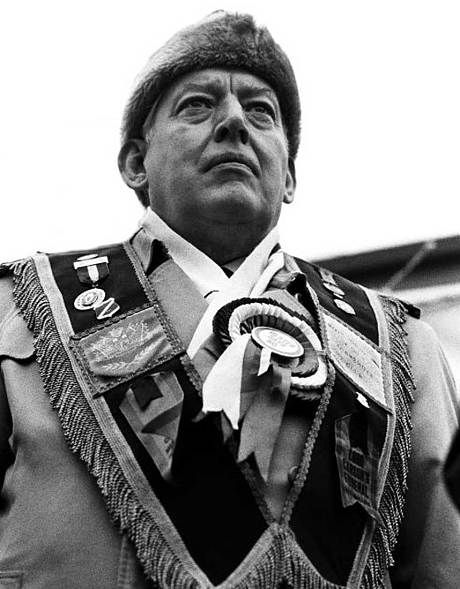 Ian Paisley. — Photo: REX.In the 2003 Assembly elections, the DUP overtook the UUP, achieving 30 seats to the UUP’s 27, and in the 2005 general election it very nearly wiped out the UUP, taking nine seats to the UUP’s one. Ian Paisley. — Photo: REX.In the 2003 Assembly elections, the DUP overtook the UUP, achieving 30 seats to the UUP’s 27, and in the 2005 general election it very nearly wiped out the UUP, taking nine seats to the UUP’s one.
In October 2005 Paisley was sworn of the Privy Council, an honour to which he became entitled as leader of the fourth largest political party in the British Parliament.
Paisley was disarmingly honest about the strategy that had served him so well since his arrival on the political scene: “I may be in the driving seat, but I don’t necessarily have to drive,” he said. “I can sit in that seat with a poker and give Tony Blair a poke in the ribs, but I don’t need to come up with any formula or solutions. The government created this mess and the onus is on Blair to come up with the solution.”
Having established himself as both the key and the main obstacle to any return to power-sharing, Paisley continued to conduct his adversarial Punch and Judy show with Gerry Adams. Yet there were signs that he was mellowing, which coincided with a bout of serious illness in 2004; that autumn he travelled to Dublin for an amicable meeting with the Taoiseach, Bertie Ahern.
When, in September 2005, a group under the Canadian General John de Chastelain confirmed that the IRA had finally decommissioned its arsenal, Paisley refused to accept their verdict, insisting: “You can’t build the bridge of trust with the scaffolding of lies and underhand deals.” And in July 2006 he told a rally in Portrush that Sinn Fein would join the government of Northern Ireland “over our dead bodies”.
Yet that October Paisley was party to the St Andrew’s Agreement — involving both the British and Irish governments — in which all parties agreed to fresh Assembly elections and a resumption of power-sharing in return for Sinn Fein accepting the Police Service of Northern Ireland. The elections confirmed him as leader of the province’s largest party, and on May 8th 2007, at the age of 81, he took office as First Minister, with Sinn Fein’s Martin McGuinness, a self-confessed former IRA commander, his deputy. Power-sharing was resumed with remarkably few difficulties, Paisley and McGuinness even attending events together until Paisley stepped down as First Minister on June 5th 2008, handing over to Peter Robinson, who would prove more intransigent.
Paisley retired as an MP at the 2010 election, being created a life peer as Lord Bannside, and in 2011 he stood down from the Assembly. That November he gave up the leadership of the Church he had headed for two-thirds of his life, retiring from the pulpit in January 2012. Yet he continued to insist: “I’ll not be changing. I will go to the grave with the convictions I have.”
Ian Paisley married, in 1956, Eileen Cassells. They had two sons, Kyle, a churchman, and Ian, MP for North Antrim and a former DUP assemblyman, and a daughter, Rhonda, a former Belfast councillor and television presenter.
• Lord Bannside, born April 6th 1926, died September 12th 2014.http://www.telegraph.co.uk/news/obituaries/11092046/Lord-Bannside-obituary.html
from The Telegraph....Ian Paisley was willing to sacrifice his beliefs for peaceBy NORMAN TEBBIT | Friday, 12 September 2014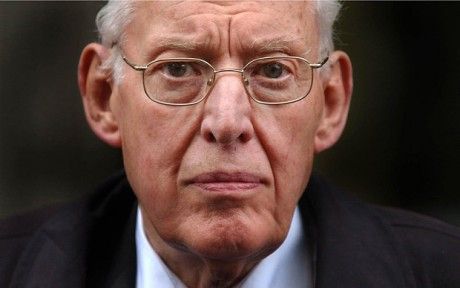 Dr Ian Paisley, the former Democratic Unionist Party leader. — Photo: PA.FEW PEOPLE were so willing as Ian Paisley at the end to sacrifice so much of his beliefs to achieve a settlement in Northern Ireland. Dr Ian Paisley, the former Democratic Unionist Party leader. — Photo: PA.FEW PEOPLE were so willing as Ian Paisley at the end to sacrifice so much of his beliefs to achieve a settlement in Northern Ireland.
Although many accused him of sacrificing principles for office, I think that it was a genuine acceptance on his part that unless sacrifices were made on both sides, there could be no settlement and only enduring strife in Northern Ireland. One hopes his political heirs will be as subtle as he eventually proved to be.
He will long be remembered as one of the builders of the settlement which is still probably the best thing that could have happened in the province.• Lord Tebbit is one of Britain's most outspoken conservative commentators and politicians. He was a senior cabinet minister in Margaret Thatcher's government and is a former Chairman of the Conservative Party. He has also worked in journalism, publishing, advertising and was a pilot in the RAF and British Overseas Airways.http://blogs.telegraph.co.uk/news/normantebbit/100286218/ian-paisley-was-willing-to-sacrifice-his-beliefs-for-peace
from The Telegraph....Ian Paisley is dead — the old hypocriteBy RUTH DUDLEY EDWARDS | Friday, 12 September 2014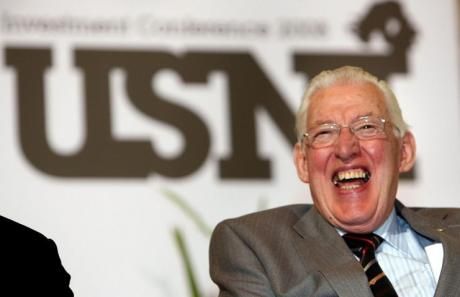 Dr Ian Paisley. — Photo: PA.IN TUNE with the always reliably amoral musings of Peter Hain, commentators have been lining up to hail the Reverend Ian Paisley, the man of peace. Dr Ian Paisley. — Photo: PA.IN TUNE with the always reliably amoral musings of Peter Hain, commentators have been lining up to hail the Reverend Ian Paisley, the man of peace.
They do admit that it took him a while to move from the path of negativity to accepting the embrace of Martin McGuinness. But that, we are told, was because circumstances had changed and he had seen the light.
Paisley was born in 1926 and didn’t become a man of peace until in 2005 it suited him to become one in exchange for a peerage, international acclaim, and the right to have it on his tombstone that he was the First Minister of Northern Ireland.
A thundering bigot and a force for ill almost all of his life, he was never targeted for assassination by the IRA leadership because they were smart enough to realise he was their best recruiting sergeant.
As a Northern Irish evangelical Christian preacher, the life choices for Paisley were rather narrow, but he took full advantage of what were available. He wanted all the adulation and power that was going and to crow on top of whatever hill there was to be on top of.
Unfortunately for Northern Ireland, Paisley had exceptional eloquence, charisma and ruthlessness necessary to destroy any who stood in his way. I will never forget the experience of listening to his powerful preaching in his Martyrs’ Memorial Church. The true believers were rapt and ecstatic.
Paisley was only 25 when he fell out with the Presbyterian church in which he was a minister and so founded the much more fundamentalist Free Presbyterian Church of Ulster. Distinguished for its abusive anti-Catholicism and its designation of all popes as anti-Christ, he was its supreme leader for almost 60 years. Then he made a U-turn on some of its core beliefs by going into government with unrepentant terrorists and taking on an office — that of First Minister — which involved responsibility for the protection of LGBT rights.
He was forced to resign as moderator, but he held on to the manse even though the church had bought him a retirement home. Paisley wasn’t motivated by financial greed, but he liked his comfort. And being a devoted father and very attached to his family, he liked storing up comforts for them too. In the interests of peace, Tony Blair gave Eileen Paisley a peerage to keep him company. Ian Junior inherited his father’s seat.
Normal unionist parties were too tame for Paisley. In 1950 he campaigned for the Ulster Unionist Party, but broke away to join the National Union of Protestants, from whom he split when its leader refused to become a member of his Free Presbyterians. After some years of the street agitation and general troublemaking in which he excelled, he did so well when contesting the constituency of Bannside against Captain Terence O’Neill, the Prime Minister, as to weaken him fatally and help bring him down.
Paisley founded the Democratic Unionist Party in 1971, which he ruled despotically until he had to step down from government in 2008. Even though nominally a constitutional politician, Paisley would use his magnetism and eloquence to convince generations of loyalists to hate and fear their Catholic neighbours. He was careful never to condone murder, but he inspired many to join the loyalist paramilitaries whom he disowned.
His political career consisted mainly of destroying every unionist leader who wanted to make peace with Irish nationalists, his most distinguished scalp being David Trimble, a man of vision and courage, who was downed by Paisley’s tribal appeals to reject the power-sharing deal with Sinn Fein, “the spawn of Satan”.
That he agreed a virtually identical deal himself was no surprise to Paisley-connoisseurs. He was well suited to holding office with Sinn Fein, whose mastery of hypocritical rhetoric rivalled his. What became known as the Paisley-McGuinness “Chuckle Brothers” routine was hailed by the credulous as a sign that old enemies were now united. What they had done, of course, was to take power and divide the spoils.
“Very sad to learn that Ian Paisley has died,” Martin McGuinness says. “My deepest sympathy to his wife Eileen & family. Once political opponents — I have lost a friend.”
I wonder how the victims of both these men feel today.• Ruth Dudley Edwards is a historian and a prize-winning biographer and crime writer. Her eleven non-fiction books include The Pursuit of Reason: The Economist, 1843-1993 and Aftermath: The Omagh Bombing and the Families’ Pursuit of Justice. Her twelfth crime novel is Killing the Emperors, a satire on the world of conceptual art.http://blogs.telegraph.co.uk/news/ruthdudleyedwards/100286257/ian-paisley-is-dead-the-old-hypocrite
|